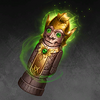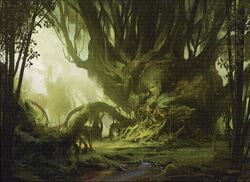Bala Ged
| Bala Ged | |
|---|---|
| Information | |
| Plane | Zendikar |
| Colors |
|
| Status | Devastated by the Eldrazi, slowly recovering. |
| Formerly part of | Makindi Empire |
| Scryfall Statistics | |
|
21 artworks | |
Bala Ged is one of the seven continents of Zendikar.[1] A giant marsh separates Bala Ged from Guul Draz. Bala Ged also connects to Akoum through underground rivers, meaning the three continents form more or less one giant continent.
History
Bala Ged was once part of the ancient Makindi Empire. The elves of Bala Ged, led by a pre-spirit Obuun, revolted against their kor rulers and toppled their Skyclave.[2]
Bala Ged used to be known for its dense jungles and deadly marshes. Hidden beneath the bogs was a network of limestone caves and tunnels that led to catacombs, sacrificial altars, and rune-inscribed chambers. Bala Ged used to be a treacherous environment full of primordial monstrosities and deadly flora.
Battle for Zendikar
Within two years of the release of the Eldrazi, the entire continent of Bala Ged was overrun and destroyed.[3]
Led by visions, the Zendikari planeswalker Nissa Revane traveled into the depths of the devastated continent to find the Khalni Heart, an outgrowth of the soul of Zendikar. Through it, she rekindled her connection to the plane—but she also ran afoul of the demon Ob Nixilis, a former Planeswalker who hoped to use the power of the Khalni Heart to reignite his spark. Flush with the elemental power of Zendikar, Nissa bested Ob Nixilis, removed the Khalni Heart to safety, and escaped.[4]
Aftermath
Bala Ged's corrupted land became the home of nightmares and horrors.[5] The ruins of the Bala Ged Skyclave have risen again to the sky above the continent.[2] After Nissa Revane's use of the healing power of the Lithoform Core, the continent slowly recovers.[6][7]
Inhabitants and wildlife
Humanoids
Elves

The primary race that called Bala Ged home was the elves of the Joraga and Mul Daya Nations. The Joraga were a warlike nomadic tribe that held high esteem for druidic power and physical prowess. They were mostly found in loose clans throughout the Tangled Vale. The Mul Daya, on the other hand, called the treetops of the jungle their home. Steeped in shamanic rituals and necromancy, these secretive elves were well-practiced as rogues, spies, and shamans.
Goblins
At the edge of the Umung River used to be a small settlement of goblins known as the Grotag. A friendly sort of goblin, they would engage in trade with other species and often live amongst them. The Grotag were aspiring beastmasters, although their efforts were usually unsuccessful. The Grotag were well adapted to Bala Ged and most notably had managed to domesticate Lagac Lizards.[8][9]
Surrakar
The only other notable "sentient" beings that called Bala Ged home were the reptilian Surrakar. They nested primarily in the Guum Wilds and acted so ferociously that much of their true nature was unknown. It was debated amongst much of Zendikar just how much intelligence and culture these creatures secretly possessed.
Elementals
Yarok is an elemental horror residing within Bala Ged. It seems to have been corrupted by the influence of Ulamog and Kozilek, turning from a guardian of life and growth to a cultivator of nightmares and horrors. However, the Lament for Bala Ged implies that it retains some control over the elements, specifically concerning blue mana, and it retains enough self-awareness to grieve for what it once had been.
Flora
Bloodbriar
Bloodbriar patches were clusters of nettled carnivorous vines. The vines constricted around anything that moved nearby them, using their thorns to siphon blood from living victims into their root system. The Joraga elves cultivated the plants to act as a natural barrier against outside threats.
Cut Fungus
Similarly, Cut Fungus was a dangerous plant that lived in the jungles of Bala Ged. The seemingly mushroom-like fungus concealed a blade-like spine underneath its cap. Changes in temperature and motion would trigger it to unfurl and unleash a spray of its spines. The spines carried a powerful neurotoxin that led to delirium, lethargy, and wartlike growths. Eventually, the victim would die, and the carcass would act as a host for a new cut fungus colony to grow.
Locations
- The Bala Ged Skyclave
- once toppled by an elf rebellion led by Obuun, now risen to soar in the skies once again.[2]
- Guum Wilds
- the humid rain forest that covered most of Bala Ged. Bloodbriar and Cut Fungus were just some of the deadly flora that made up the vast jungle. Almost every inch of the Guum Wilds was covered in dense flora, and the air often was heavy with fetid humidity.[1] The Mul Daya build their villages here in large trees.[10]
- The Bordermire
- a swamp that reaches to the edge of Bala Ged. Home of nema crocodiles.[1]
- The Khalni Heart
- a huge magical flower that is an extension of Zendikar's world soul, budded during the Battle for Zendikar, can be found somewhere in the Guum Wilds, hidden in a mostly underground cavern.
- Riverroot - a Mul Daya village.[10]
- The Surrakar Caves
- a series of limestone outcroppings and hillocks that served as the primary habitat for the vicious Surrakar. There was rumored to be a vast tunnel system underneath this portion of the Guum Wilds, but exploration was next to impossible due to the extreme territorial behavior of the native creatures.[1] Despite the cavernous nature, this region was primarily covered in thick algae and marsh.
- The Umung River
- One of the only safe ways to traverse the Guum Wilds. After passing through the dangerous Bojuka Bay, there were dotted settlements of humans and elves that had been created to help travelers get past areas of rapids and waterfalls. Each waterfall step took explorers even deeper into the heart of Bala Ged.[1]
- Bojuka Bay
- less a bay and more a giant marsh that developed inside the Guum Wilds. Initially, an inlet, the prolific flora of the Guum Wilds had overtaken the water, creating a vast swampy region. The Bojuka Bay served as the mouth of the Umung River and was home to fearsome marsh trolls as well as the Grotag goblins. A sea route into the Bay, called the Bojuka Route, was opened after twenty years of preparation, but was forced to close after a single year.[1]
- Umungshore - a settlement along the river.
- Bojuka Bay
- The Bordermire
- The Slim Blade - a tongue of land where two famous rivers meet, at the western edge of Joraga territory.[11]
- The Tangled Vale
- a series of interconnected jungle valleys that lay in the southern portion of Bala Ged. Joraga elves primarily called this home, utilizing Bloodbriar patches to defend themselves against the beasts that roamed the vicinity. The various hilltops of the region were rife with deadly fungus and well known to be Gomazoa feeding grounds.[1]
- Ulamog's Devastation
- Much of the ground of Bala Ged is barren and lifeless. Many of the Joraga elves were killed by the titans, and the rest scattered to far-flung regions, and some believe that their absence is preventing the land from regenerating itself as other areas, such as Murasa, have done. The Joraga elves had a deep spiritual connection to the land, and it is possible that their careful tending of the wilds was essential to Bala Ged’s continued survival. However, Zendikar is attempting to reclaim Bala Ged. A new Khalni Heart, like the enormous flower that grows in Akoum, is budding deep within a cave on Bala Ged.[12]
Gallery
-
The Khalni Heart
-
The Tangled Vale
In-game references
- Associated cards:
- Referred to:
- Lament for Bala Ged:
- Triumph of Bala Ged:
References
- ↑ a b c d e f g Magic Creative Team (September 30, 2009). "A Planeswalker's Guide to Zendikar: Bala Ged and Elves". magicthegathering.com. Wizards of the Coast. Archived from the original on 2019-08-12.
- ↑ a b c Ari Zirulnik and James Wyatt (September 1, 2020). "Zendikar: Thing Have Changed". magicthegathering.com. Wizards of the Coast.
- ↑ Ari Levitch (July 15, 2015). "Limits". magicthegathering.com. Wizards of the Coast. Archived from the original on 2015-07-18.
- ↑ Kimberly J. Kreines (October 7, 2015). "Nissa's Resolve". magicthegathering.com. Wizards of the Coast. Archived from the original on 2015-10-09.
- ↑ Yarok, the Desecrated, Yarok's Fenlurker
- ↑ Bala Ged Recovery
- ↑ A. T. Greenblatt (September 30, 2020). "Eoisode 5: The Two Guardians". magicthegathering.com. Wizards of the Coast.
- ↑ Magic Creative Team (December 16, 2009). "A Planeswalker’s Guide to Zendikar: Goblins". magicthegathering.com. Wizards of the Coast. Archived from the original on 2021-04-29.
- ↑ Magic Arcana (February 24, 2010). "Knight or Necklace?". magicthegathering.com. Wizards of the Coast. Archived from the original on 2021-04-29.
- ↑ a b A. Z. Louise (September 18, 2020). "Beneath Riverroot Tree". magicthegathering.com. Wizards of the Coast.
- ↑ a b Robert B. Wintermute (2010) - Zendikar: In the Teeth of Akoum, Wizards of the Coast
- ↑ James Wyatt (January 5, 2016) - The Art of Magic: The Gathering - Zendikar, WotC.



